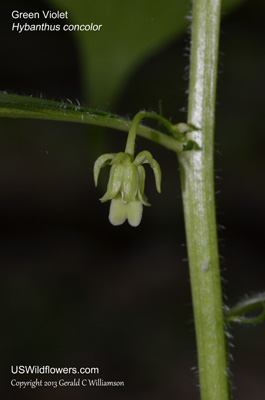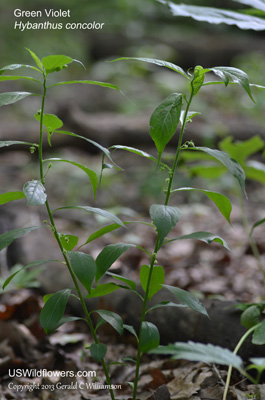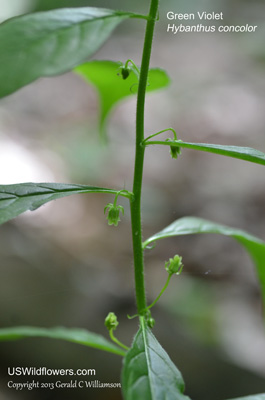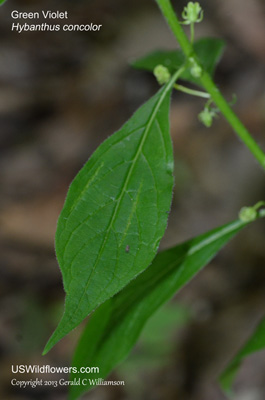Green Violet, Eastern Greenviolet - Hybanthus concolor
|
Hybanthus concolor - Green Violet, Eastern Greenviolet. USDA lists 4 species of Hybanthus in the United States. Two are found in only a single state (H. attenuatus in Arizona, and H. linearifolius in Florida). H. verticillatus (Babyslippers) is found in six mid- to southwestern states. The species here, photographed in Georgia, has the widest distribution, being found in most of the eastern half of the United States. It is also found in Ontario, Canada.
Another species, H. parviflorus, is not native to the United States but was found in Georgia in 1998 and identified as that Argentinian species; this species was also found in New Jersey in the 19th century, but has not been identified there since. There are many other species worldwide in the Hybanthus genus, but there is consideration to splitting Hybanthus into two genera - Hybanthus with only a few species (H. concolor remaining) and a much larger genus, Pombalia.
Hybanthus concolor is classified as follows: Connecticut - Special Concern, Florida - Endangered, Iowa - Threatened, New Jersey - Endangered.
Found in:
AL, AR, CT, DC, DE, FL, GA, IA, IL, IN, KS, KY, MD, MI, MO, MS, NC, NJ, NY, OH, OK, PA, SC, TN, VA, VT, WI, WV
Leave comments on Hybanthus concolor at this link. | 
Distribution of Hybanthus concolor in the United States and Canada:

Blue=Native; Grey=Introduced
Map from USDA Plants Database:
USDA, NRCS. 2017. The PLANTS Database (http://plants.usda.gov, 08 May 2025). National Plant Data Team, Greensboro, NC 27401-4901 USA.
Search Our Database: Enter any portion of the Scientific, Common Name, or both.
Do a general Google search of the entire site:
#ad
 Follow USWildflowers on Twitter
#ad
| | Site: Blue Hole Area, Pigeon Mountain East, Walker County, GA Date: 2010-April-08 | Photographer: Gerald C. Williamson
Nikon D60
Tamron SP 90MM f/2.8 AF Macro | | There may be one to several flowers in the leaf axils of the Green Violet plant. | | 
| | Site: The Pocket at Pigeon Mountain, Walker County, GA Date: 2013-May-07 | Photographer: Gerald C Williamson
Nikon D7000
Tamron SP 90MM f/2.8 AF Macro | | The axillary flowers of Green Violet have 5 pale green sepals and 5 pale green petals. The sepals are usually distinctly separated from the petals. One of the 5 petals (the one in the back in this photo) is larger and somewhat lobed, similar to most other members of Violaceae. | | Click on the photo for a larger image

| | Site: The Pocket at Pigeon Mountain, Walker County, GA Date: 2013-May-07 | Photographer: Gerald C Williamson
Nikon D7000
Tamron SP 90MM f/2.8 AF Macro | | Green Violet is certainly not a showy plant, carrying its small green flowers under the cover of a green, leafy plant. The plant grows among other understory plants in rich, moist forests. | | Click on the photo for a larger image

| | Site: The Pocket at Pigeon Mountain, Walker County, GA Date: 2013-May-07 | Photographer: Gerald C Williamson
Nikon D7000 | | The leaves of Hybanthus concolor are alternate along the somewhat hairy stem, with the small flowers growing on relatively long pedicels in the leaf axils. | | Click on the photo for a larger image

| | Site: The Pocket at Pigeon Mountain, Walker County, GA Date: 2013-May-07 | Photographer: Gerald C Williamson
Nikon D7000 | | The leaves of Hybanthus concolor are up to 6 inches long with an acute tip. They are usually entire, but may occasionally have a few teeth. What may look at first glance as fine serration along the margin is actually a hairy margin. | | Click on the photo for a larger image

|
References used for identification and information:
|
|
| |
| #ad
|
|







